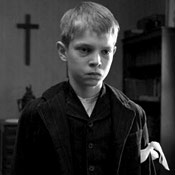- REVIEW
- READER REVIEWS
The White Ribbon (Das weisse Band)
|
(No longer in theaters)
|
|
Genre
Drama, War
Producer
Stefan Arndt, Veit Heiduschka, Michael Katz, Margaret Ménégoz
Distributor
Sony Pictures Classics
Release Date
Dec 30, 2009
Release Notes
NY/LA
Review
With The White Ribbon, the German director Michael Haneke follows Lars von Trier (Antichrist) in borrowing a serviceable horror-movie premise, gussying it up for the international festival crowd, and passing off its sclerotic insights as harsh new truths about the essential evil of man (and woman and child). Von Trier wallowed in psychodrama and metaphysics (and gore), but Haneke has a social agenda. His brow lifted higher than usual, he attempts to depict the festering psyche of the Germans on the brink of World War I. The movie plays like an Ingmar Bergman remake of the little-kids-from-space picture Village of the Damned—except if Bergman had made it, he might have set out to discover something he didn’t already know. Haneke’s contempt for humanity had congealed into dogma before he shot his first frame of film. The movie is a long 144 minutes.
Haneke’s setting is a small village rocked by acts of malevolence. A doctor and his poor horse connect with a trip wire. A farmer’s wife working for the town’s chief landowner, a baron, falls through a hole in the floor—shortly after which the baron’s little son is found strung up and lashed, with a note that says the sins of the father will be visited on the child. Who could be responsible for such acts? The ingenuous male schoolteacher (who relays the story of the village as an old man) notices a group of children led by an obsequiously angelic blonde girl and her guilty-looking brother as they troop down the street to ascertain the condition of the latest victim. By and by, the blonde gazes with disgust on a boy with Down syndrome—clearly an inferior specimen. The teacher sees the brother balancing over a precipice: The boy says he’s giving God a chance to kill him for crimes unspecified. As in the revenge-of-the-repressed quasi mystery, Caché, Haneke doesn’t deign to deliver the genre goods—resolution, catharsis, etc. That way he can crudely spell out his themes and yet still give the bourgeois audience the finger.
Haneke depicts the whole village as morally corroded: economic exploitation, incest, corporal punishment of kids, hypocrisy, too. The title refers to the white ribbon the minister ties to his eldest daughter to remind her of innocence and purity. Later, he binds his elder son to the bed to keep the boy from masturbating. Few can resist abusing power: It’s a virus. And we know where it’s leading: to blind obedience, collective madness, fascism. Somewhere along the way, the director made the leap from generalized sadism (Benny’s Video and Funny Games—so not nice he made it twice) to political indictments (Caché). But his basic sadistic impulse never evolved.
Christian Berger has shot The White Ribbon in stark black and white, in imitation of Sven Nykvist’s work in early Bergman. It’s striking. But Bergman pared down the frame to allow us to scrutinize his actors’ emotions, while Haneke’s faces are (Scandinavian-looking) masks. Chill to the core, he presents human cruelty not to make us empathize with the victims or understand the oppressors but to rub our noses in the crimes of our species. He thinks he’s held on to the subversive ideals of punk, but all I smell is skunk.
Related Stories
New York Magazine Reviews
- David Edelstein's Full Review (1/4/10)
